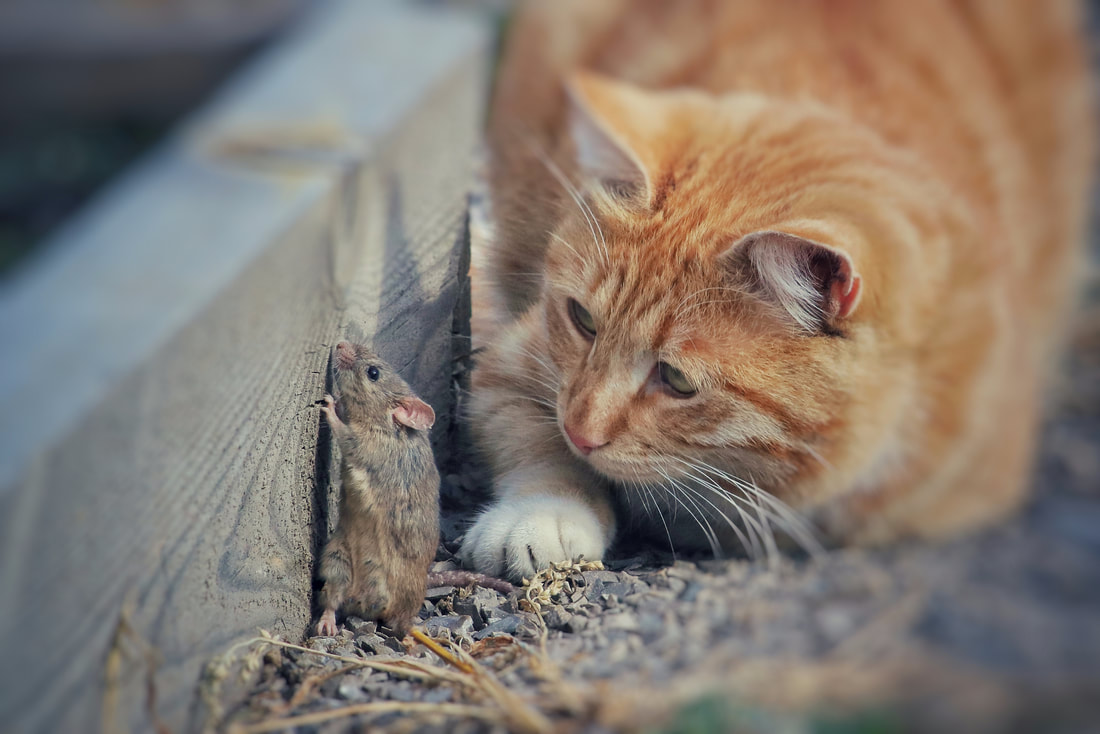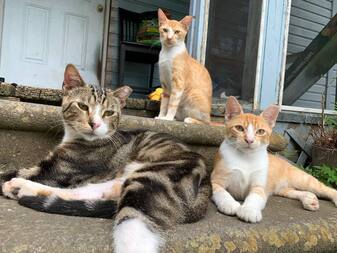While Lifeline of Galveston County believes that TNRing community cats (also known as feral, semi-feral, neighborhood cats, etc) through our county-wide community cat program is the best option for controlling the outdoor cat population, sometimes these cats end up in our county's municipal animal shelters because they were trapped in their neighborhood of origin. These cats are at a very-high risk of being euthanized due to their unsocialized behavior.
Lifeline also occasionally ends up with cats in our adoption program who need non-traditional placement due to their temperament. This can happen when we need to help relocate a colony of cats due to a caretaker's death, extreme overpopulation in a specific area or for a variety of other reasons.
These cats may not be comfortable living in a traditional home setting, but would be incredibly helpful and happy as working cats to local homeowners, landowners, and businesses who have a need for pest control.
Lifeline also occasionally ends up with cats in our adoption program who need non-traditional placement due to their temperament. This can happen when we need to help relocate a colony of cats due to a caretaker's death, extreme overpopulation in a specific area or for a variety of other reasons.
These cats may not be comfortable living in a traditional home setting, but would be incredibly helpful and happy as working cats to local homeowners, landowners, and businesses who have a need for pest control.
The Process:
- Apply to adopt a working cat or multiple cats by submitting an application.
- Complete a quick assessment screening via text or phone call with our team. You can tell us any sex or color preferences you may have at that time.
- Generally within one week, we will schedule your pick-up day! You will pick up your fixed and vetted barn cat or cats at our center in Webster, TX.
- Acclimate your new cat(s) for 2-4 weeks, feeding, watering and changing litter regularly. Learn more about acclimating your cat here.
- Release cats to roam freely after the 2-4 week acclimation period. Food, water and access to shelter should still be provided to them at all times after releasing them.
FAQs About Adopting Working Cats:
How much does it cost to adopt a working cat?
The adoption fee is $20, but there is no additional adoption fee if you adopt more than one cats. You will also be responsible for ongoing veterinary care (as necessary), food, water, and shelter.
What do I do when I bring the cat or cats home?
When you bring the new cats home, they will need to be confined to an escape-proof room or enclosure like a tack room, garage, coop, or XXL dog crate for 2-4 weeks while they acclimate to their new surroundings. You will feed/water and clean the litter pan daily during the confinement period. After this period of confinement, the cats will usually accept their new home and may be released. You will continue to provide daily food and water and allow them access to shelter such as your barn or garage.
Are they spayed/neutered?
Yes. All barn cats come spayed or neutered, current on vaccinations, microchipped, treated for worms and fleas, and tested for feline leukemia.
Will I be responsible for future vaccinations?
Any cat you adopt from Lifeline of Galveston County will be current on vaccinations. Following adoption, you will be responsible for keeping the animals’ vaccinations up to date. The best way to have feral cats vaccinated is with the use of a live humane trap. SNIP in League City and Animal Alliance in La Marque both offer low-cost vaccinations and are experienced in safely vaccinating feral cats who arrive in humane traps.
Do you have any friendly working cats?
No; while some of the cats in the barn cat program are more social than others, these are not "lap cats". They have no desire to be “lap cats” and generally cannot be touched, or may take a very long time to trust enough to be pet. We strongly encourage adopters to offer cats in this program an independent outdoor life complemented by appropriate care and shelter like a barn or garage.
Do you have any working kittens?
The youngest cats in the Working Cat Program are approximately six months old. Lifeline will not adopt younger kittens as working cats, as they don’t yet have the knowledge, size, or skills to remain safe outdoors. Most cats in the barn program are young adults between one and five years of age, though we do have younger and older cats available occasionally. If you have an age preference, just let us know and we will do our best to accommodate you!
What do working cats require?
The cats require shelter in a permanent building or structure like a barn, shed, stable, or garage in a suitable rural area where they will be safe. The property should be at least .5 miles away from busy roads. Daily food and water must be provided, as well as any future medical care needed. The cats must also be kept confined for the initial 2-4 week relocation period to ensure a successful transition to their new home.
Can I come look at, or select, my working cats?
Available working cats are kept in several different shelters and habitats which are not accessible to visitors for safety and logistical reasons. When you apply to adopt, you can let us know any special requests. We will take your request into account and select a cat or cats for you based on your application. If you have a color, age, or gender preference, we will do our best to accommodate you.


